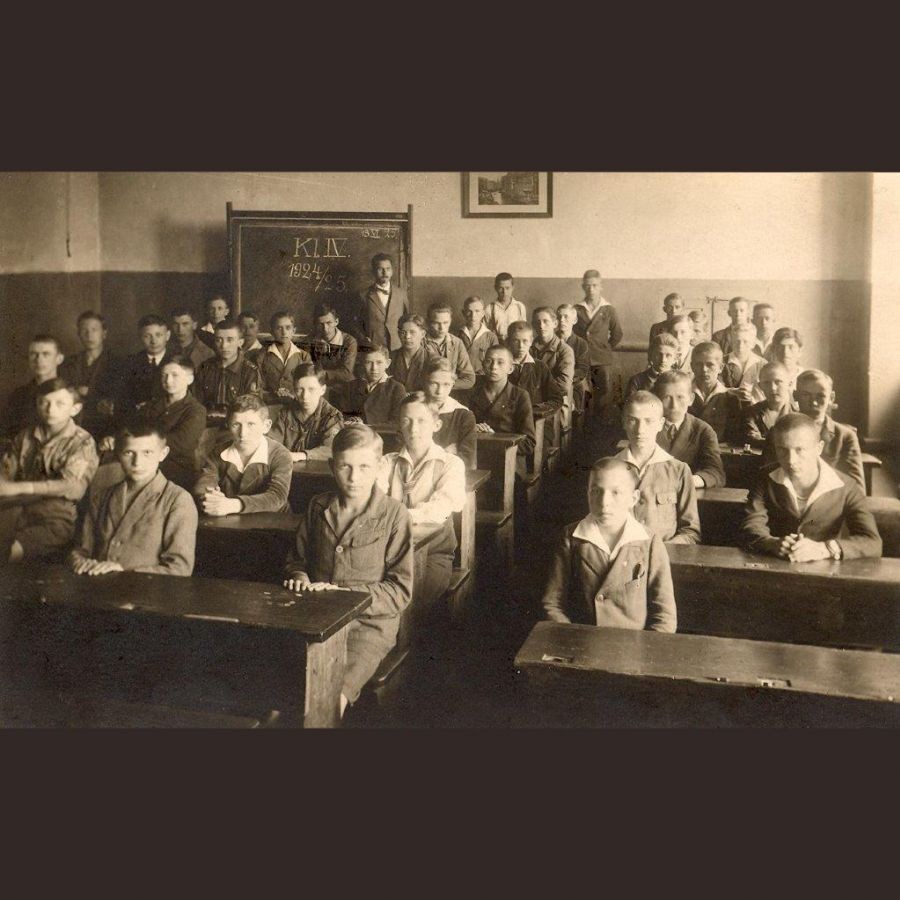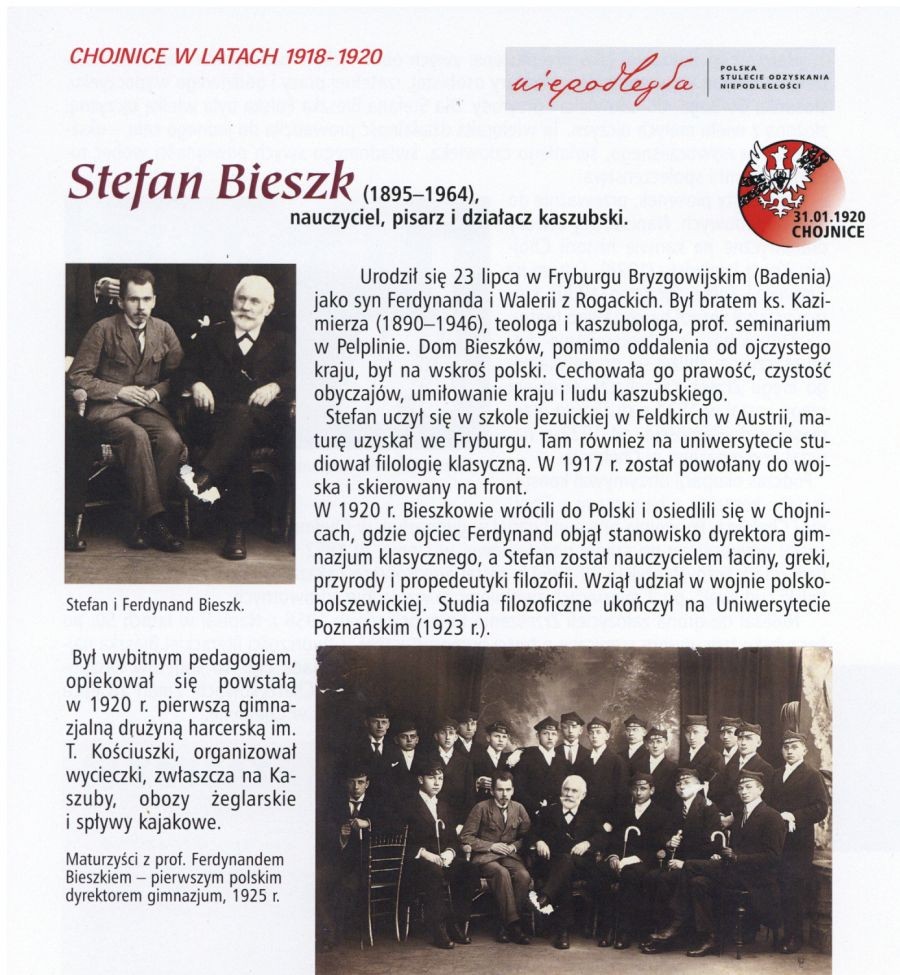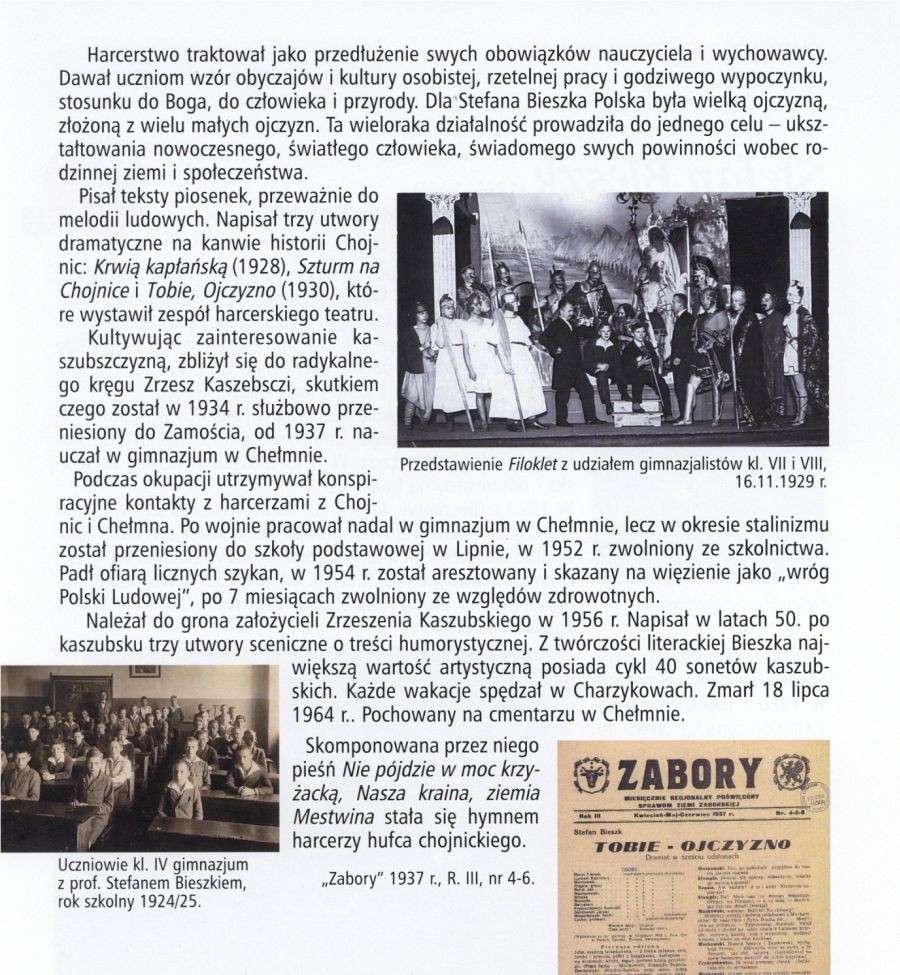
Stefan Bieszk (1895-1964), teacher, writer and Kashubian activist
Young people today are looking for authorities in their lives, people they can look up to. Although times change, new technologies are introduced, but certain values remain constant and universal. In the past century, which was marked by wars and human tragedies, there was no shortage of great people who, despite adversity, were still able to be guided in their actions by the good of others. Stefan Bieszk was one such authority who made a lasting mark on the history of Chojnice and our region. He regarded teaching children and young people as his vocation. His lessons were never boring; on the contrary, they were surprising and created an atmosphere of a fascinating adventure of getting to know the world. Young people and children were always the centre of Professor Bieszek's attention and concern. He devoted his free time to scouting by organising rallies, canoeing trips and camps all over Pomerania, especially on Lake Charzykowskie. He also infected young people with his passion by organising numerous trips around Kashubia, including sailing on the ‘Hulaj Dusza’ yacht. As a lover of our region, its folklore and people, he learned Kashubian while getting to know his ‘little homeland’ during numerous hikes with his brother, Father Kazimierz. Prof. Bieszk is an outstanding example of understanding the process of education of children and young people as a wonderful journey through life full of adventure, getting to know nature and discovering universal values, valid in all times.
Stefan Bieszk was born on 23 July 1895 in Freiburg im Breisgau, Baden. He was educated at the Jesuit school in Feldkirch, Austria, and matriculated in Freiburg. There he also studied classical philology at the university. In 1917 he was drafted into the army and sent to the front.
In 1920. The Bieszkos returned to Poland and settled in Chojnice. Stefan's father took up the post of headmaster of the classical gymnasium, and he became a teacher of Latin, Greek, nature and propaedeutics of philosophy. He took part in the Polish-Bolshevik war. He completed his philosophical studies at the University of Poznań in 1923.
Stefan Bieszk was an outstanding pedagogue. From 1920, he took care of the newly established first junior high school scout troop named after Tadeusz Kościuszko. He treated scouting as an extension of his teaching and educational duties. For him, Poland was a great homeland, made up of many small homelands.
He was a songwriter, mostly to folk tunes. He wrote three dramatic works based on the history of Chojnice: ,,Krwią kapłańską‘ (’With Priestly Blood‘) (1928), “Szturm na Chojnice” (’Storm on Chojnice‘) and “Tobie, Ojczyzno” (’To You, Fatherland") (1930), which were staged by a scout theatre company. Cultivating his interest in Kashubian language, Bieszk came close to the radical Zrzesz Kaszebsczi circle, as a result of which he was transferred to Zamość in 1934. From 1937, he taught at a secondary school in Chelmno. During the Stalinist period, he was transferred to a primary school in Lipno, and in 1952 was - dismissed from education
From 1952 to 1954, Professor Stefan Bieszk taught Latin at the Major Seminary in Pelplin, being the teacher of, among others, the future priest Ludomir Warnke. His moving memoirs have been preserved, showing Prof. Bieszk as a demanding pedagogue, but also as a just and understanding man who was a friend to his students (Byłem uczniem Stefana Bieszka, Filomata, nr 5, 2009, pp. 96 - 99).
He fell victim to numerous harassments - in 1954 he was arrested and sentenced to prison as ‘an enemy of the People's Republic of Poland’. He was one of the founders of the Kashubian Association. In the 1950s, he wrote three humorous stage plays in Kashubian. Among Bieszk's literary works, the cycle of 40 Kashubian sonnets has the greatest artistic value.
Stefan Bieszk died on 18 July 1964 and was buried in the cemetery in Chełmno. He was an outstanding educator who gave his pupils an example of manners and personal culture, reliable work, proper attitude towards God, man and the surrounding world. The Chojnice community honoured its professor through the patronage of the Pedagogical Library, the Technical School in the Chojnice School Complex, and the naming of one of the streets after him.

